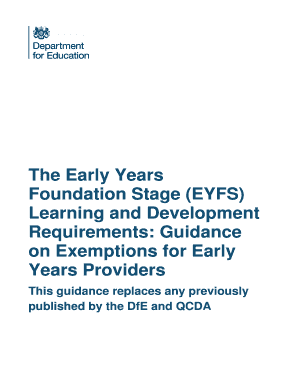
Get Early Years Foundation Stage (eyfs) Learning And Development Requirements: Guidance On Exemptions
How it works
-
Open form follow the instructions
-
Easily sign the form with your finger
-
Send filled & signed form or save
How to fill out the Early Years Foundation Stage (EYFS) Learning And Development Requirements: Guidance On Exemptions online
This guide provides comprehensive, user-friendly instructions for completing the Early Years Foundation Stage (EYFS) Learning And Development Requirements: Guidance On Exemptions form online. It aims to help users navigate each component of the form easily and efficiently.
Follow the steps to accurately complete the exemption form online.
- Click 'Get Form' button to access the form and open it in the selected online editor.
- Begin by reading the introduction section carefully to understand the context of the document and the purpose of the exemptions.
- Fill in the provider details, including the name, registration number, and contact information. Ensure accuracy as this information is crucial for further correspondence.
- Identify the type of exemption being sought. Indicate whether applying under the independent schools route or the established principles route by checking the respective boxes.
- Provide details related to the last inspection report, ensuring to include the judgments received. This is necessary for meeting the quality threshold.
- Seek and document the views of parents regarding the exemption request, as this is a required step. Attach any documentation evidencing this consultation.
- Inform and provide the relevant local authority with the information that an exemption request is being filed.
- Once you have filled in all required fields, review the application thoroughly for completeness and to ensure all necessary attachments are included.
- Submit the application electronically to the specified email address. If using a hard copy, send it to the provided physical address of the Department for Education.
- Await confirmation from the Department for Education regarding your exemption application. The Department will notify you about the success or any required actions on your submission.
- After receiving confirmation, keep the notification and any correspondence for your records and ensure to inform parents about the outcome of the application.
Start filling out the EYFS exemption documentation online today to ensure compliance and clarity for your early years provision.
The EYFS profile assessment is a comprehensive evaluation that measures a child's development at the end of the foundation stage, typically at age five. It assesses children's achievements across various areas of learning outlined in the EYFS framework. This assessment provides critical insights for educators and parents, ensuring alignment with the EYFS Learning And Development Requirements: Guidance On Exemptions.
Industry-leading security and compliance
-
In businnes since 199725+ years providing professional legal documents.
-
Accredited businessGuarantees that a business meets BBB accreditation standards in the US and Canada.
-
Secured by BraintreeValidated Level 1 PCI DSS compliant payment gateway that accepts most major credit and debit card brands from across the globe.


